FOR YOU
Well Health Organic Stress Management

De-Stress and Reclaim Your Well-being: A Guide to Wellhealthorganic Stress Management
Stress. It’s a four-letter word that can wreak havoc on our physical and mental health. From daily deadlines to life-altering events, stress is an inevitable part of life. But what if there were ways to manage stress organically, promoting a sense of calm and well-being?
This is where wellhealthorganic stress management comes in. It’s about incorporating natural techniques and practices into your daily routine to combat stress and cultivate inner peace. Here, we’ll delve into the world of wellhealthorganic stress management, exploring effective methods to bring balance back into your life.
Understanding Stress: The Root of the Problem
Before tackling stress, it’s crucial to understand its source. Stress is the body’s response to a perceived threat or challenge. While short-term stress can be motivating, chronic stress can have detrimental effects on our health. Physical symptoms like headaches, muscle tension, and digestive issues can manifest. Emotionally, stress can lead to anxiety, irritability, and difficulty concentrating.
Wellhealthorganic Stress Management Techniques:
- Harness the Power of Nature: Immerse yourself in the tranquility of nature. Go for a walk in the park, spend time gardening, or simply sit outside and breathe in the fresh air. Studies have shown that spending time in nature reduces stress hormones and promotes feelings of calm.
- Move Your Body: Exercise is a potent stress reliever. Engage in activities you enjoy, whether it’s a brisk walk, yoga practice, or dancing to your favorite tunes. Physical activity releases endorphins, natural mood elevators that combat stress and promote feelings of well-being.
- Mindfulness and Meditation: Mindfulness practices like meditation train your mind to focus on the present moment, reducing anxiety and promoting relaxation. There are numerous guided meditations available online or through apps to help you get started.
- The Power of Breathwork: When stressed, our breathing becomes shallow and rapid. Deep breathing exercises, like diaphragmatic breathing, slow down the heart rate and activate the body’s relaxation response. Take slow, deep breaths from your belly for a quick and effective way to manage stress in the moment.
- Prioritize Sleep: A good night’s sleep is essential for stress management. Aim for 7-8 hours of quality sleep each night. Establish a relaxing bedtime routine, create a sleep-conducive environment, and avoid screens before bed.
- Nourish Your Body: What you eat directly impacts your stress levels. Opt for a balanced diet rich in fruits, vegetables, whole grains, and lean protein. Limit processed foods, sugary drinks, and excessive caffeine, which can exacerbate stress symptoms.
- Connect with Loved Ones: Social support is a powerful stress buffer. Spend time with loved ones who make you feel supported and understood. Talking to a trusted friend, family member, or therapist can provide a valuable outlet for processing stress.
There are various natural approaches to stress management that people find effective. Here are some suggestions:
- Mindfulness and Meditation: Practicing mindfulness or meditation can help calm the mind and reduce stress. It involves focusing on the present moment and observing thoughts and feelings without judgment.
- Exercise: Regular physical activity, such as walking, jogging, yoga, or tai chi, can help reduce stress levels by releasing endorphins, which are natural mood lifters.
- Healthy Diet: Eating a balanced diet rich in fruits, vegetables, whole grains, and lean proteins can provide the nutrients your body needs to cope with stress. Avoid excessive caffeine, sugar, and processed foods, as they can contribute to stress and anxiety.
- Herbal Remedies: Certain herbs, such as chamomile, lavender, and valerian root, have been traditionally used to promote relaxation and reduce stress. These can be consumed as teas or supplements, but it’s essential to consult with a healthcare professional before using herbal remedies, especially if you’re taking medications.
- Breathing Exercises: Deep breathing exercises can help activate the body’s relaxation response, reducing stress and promoting a sense of calm. Techniques like diaphragmatic breathing or the 4-7-8 technique can be effective.
- Quality Sleep: Prioritize getting enough sleep each night, as sleep deprivation can exacerbate stress. Establish a relaxing bedtime routine and create a comfortable sleep environment to improve sleep quality.
- Social Support: Spending time with friends and loved ones, or participating in support groups, can provide emotional support and help you cope with stress more effectively.
- Time Management: Organize your time and prioritize tasks to reduce feelings of overwhelm. Break larger tasks into smaller, manageable steps and delegate when possible.
- Limiting Exposure to Stressors: Identify sources of stress in your life and take steps to minimize or eliminate them. This might involve setting boundaries, saying no to additional commitments, or avoiding certain environments or situations.
- Seek Professional Help: If you’re struggling to manage stress on your own, don’t hesitate to seek support from a mental health professional. They can provide personalized strategies and techniques to help you cope with stress more effectively.
Wellbealth Organic: Your Partner in Stress Management
At Wellbealth Organic, we offer a range of natural products to support your stress management journey. From calming herbal teas to soothing essential oils, we have something for everyone. Additionally, our blog is a treasure trove of information on healthy living and stress-reduction techniques.
Remember, stress management is a continuous process. By incorporating these simple yet effective tips into your daily routine, you can cultivate inner peace, enhance your well-being, and live a more fulfilling life.
In addition to the tips mentioned above, consider these practices for a well-rounded approach to stress management:
- Spend time in nature: Immersing yourself in nature has proven benefits for reducing stress and promoting mental well-being.
- Practice gratitude: Taking time each day to appreciate the good things in your life can shift your perspective and boost your mood.
- Limit screen time: The constant stimulation from electronic devices can contribute to stress. Set boundaries and disconnect regularly.
- Learn to say no: Don’t be afraid to say no to commitments that will overload your schedule and leave you feeling overwhelmed.
Remember, wellhealthorganic stress management is a journey, not a destination. Experiment with different techniques and find what works best for you. By incorporating these practices into your daily routine, you can effectively manage stress, cultivate inner peace, and enhance your overall well-being.
Take charge of your stress and reclaim your well-being. Embrace wellhealthorganic stress management and embark on a path to a calmer, healthier you!
FAQs on Well Health Organic Stress Management
1. What are adaptogenic herbs, and how can they help with stress?
Ans. Adaptogenic herbs are a group of plants that help the body adapt to stress. They work by regulating the stress hormone cortisol and promoting a sense of calm. Wellbealth Organic offers Ashwagandha and Rhodiola, two adaptogenic herbs known for their stress-relieving properties.
2. How much exercise is recommended for stress management?
Ans. Regular physical activity is a powerful stress reliever. Aim for at least 30 minutes of moderate-intensity exercise most days of the week. Even small bouts of movement, like a brisk walk or a short yoga session, can significantly reduce stress levels.
3. What are some tips for getting better sleep to manage stress?
- Establish a regular sleep schedule and stick to it as much as possible, even on weekends.
- Create a relaxing bedtime routine that includes activities like taking a warm bath, reading a book, or practicing mindfulness exercises.
- Avoid caffeine and alcohol close to bedtime, as they can disrupt sleep.
- Make sure your bedroom is dark, quiet, and cool.
4. What are some mindfulness practices that can help with stress?
Ans. Mindfulness is the practice of focusing your attention on the present moment without judgment. Meditation, deep breathing exercises, and yoga are all excellent ways to cultivate mindfulness. Wellbealth Organic’s blog has resources to get you started with mindfulness practices.
5. Why is social connection important for stress management?
Ans. Strong social connections provide emotional support and a sense of belonging. Spending time with loved ones who make you feel appreciated can buffer the effects of stress.
6. What foods should I avoid to manage stress?
Ans. Limit processed foods, sugary drinks, and excessive caffeine. These can worsen anxiety and disrupt sleep patterns. Focus on a balanced diet rich in fruits, vegetables, whole grains, and lean proteins to nourish your body and support stress management.
7. What are some benefits of deep breathing for stress relief?
Ans. Deep breathing activates the body’s relaxation response, slowing your heart rate and lowering blood pressure. When stress hits, take a few slow, deep breaths through your nose and exhale slowly through your mouth.
8. How can spending time in nature help with stress?
Ans. Studies have shown that spending time in nature can significantly reduce stress levels, improve mood, and boost cognitive function. Take a walk in the park, hike in the woods, or simply sit outside and soak up the fresh air and sunshine.
9. How can practicing gratitude help me manage stress?
Ans. Taking time each day to appreciate the good things in your life, big or small, can shift your perspective and promote feelings of positivity and contentment. Gratitude journaling is a simple practice that can significantly reduce stress.
10. I’m feeling overwhelmed. What are some additional tips for managing stress?
Ans. Set realistic goals: Don’t try to do too much at once. Break down large tasks into smaller, more manageable steps.
- Learn to say no: It’s okay to set boundaries and decline requests that will add to your stress.
- Delegate tasks: If possible, delegate tasks to others to free up your time and reduce your workload.
- Take breaks throughout the day: Schedule time for relaxation and activities you enjoy.
- Seek professional help: If you’re struggling to manage stress on your own, consider talking to a therapist or counselor.
READ MORE;
FOR YOU
Understanding the Meaning and Significance of Angel Number 411

Angel numbers are powerful messages from the spiritual realm, guiding us on our life path. One such significant number is angel number 411. If you’ve been seeing 411 frequently, it’s not a mere coincidence but a divine message. This article explores the meaning, symbolism, and spiritual significance of angel number 411, offering insights into what your guardian angels are trying to communicate.
The Essence of Angel Numbers
What Are Angel Numbers?
Angel numbers are sequences of numbers that appear repetitively in our lives. These numbers carry specific vibrations and meanings, serving as messages from our guardian angels. They offer guidance, support, and encouragement, helping us navigate our journey with clarity and purpose.
Recognizing Angel Numbers
Angel numbers can manifest in various forms—on clocks, license plates, receipts, and other everyday items. When a particular number sequence appears repeatedly, it’s a sign that your angels are reaching out to you.
Breaking Down Angel Number 411
Components of 411
To understand the full meaning of angel number 411, we need to break it down into its individual components:
- Number 4: Represents stability, practicality, hard work, and building solid foundations.
- Number 1: Symbolizes new beginnings, leadership, self-reliance, and motivation. The presence of two 1s amplifies these attributes.
Together, these numbers create a potent message of transformation, leadership, and the importance of laying a strong foundation for future endeavors.
Combined Meaning of 411
Angel number 411 combines the energies of 4 and 1, emphasizing the need for a balanced approach to achieving your goals. It encourages you to take the initiative, lead with confidence, and focus on creating stability in your life. Your angels are reminding you that hard work, combined with a positive attitude, will lead to success and fulfillment.
Spiritual Significance of Angel Number 411
Messages from Your Angels
Angel number 411 carries several key messages from your guardian angels:
1. Embrace New Beginnings
Your angels are urging you to embrace new opportunities and embark on fresh ventures. This is a time of transformation and growth, and they are encouraging you to step out of your comfort zone and pursue your passions with determination and confidence.
2. Build a Strong Foundation
The number 4 in 411 signifies the importance of laying a solid foundation. Whether it’s in your career, relationships, or personal development, focus on creating stability and structure. This will ensure long-term success and provide a secure base from which you can grow and thrive.
3. Lead with Confidence
The double appearance of the number 1 highlights the importance of leadership and self-reliance. Trust in your abilities and take charge of your life. Your angels are reminding you that you have the strength and capability to achieve your goals and make a positive impact.
4. Stay Positive and Motivated
Maintaining a positive attitude is crucial. Your angels are encouraging you to stay motivated and keep your thoughts focused on your desired outcomes. Positive thinking will attract positive energy, helping you manifest your goals more effectively.
Practical Applications of Angel Number 411
Steps to Align with 411’s Guidance
To fully embrace the messages of angel number 411, consider the following practical steps:
1. Reflect and Plan
Take time to reflect on your current situation and identify areas where you can create more stability. Develop a clear plan for achieving your goals, ensuring that you build a strong foundation for future success.
2. Take Initiative
Don’t wait for opportunities to come to you. Take proactive steps towards your goals. Whether it’s starting a new project, learning a new skill, or making positive changes in your life, take the initiative and lead with confidence.
3. Cultivate Positivity
Surround yourself with positive influences and maintain an optimistic outlook. Practice gratitude, affirmations, and visualization to keep your thoughts aligned with your goals.
4. Seek Support
While self-reliance is important, don’t hesitate to seek support and guidance when needed. Your angels, as well as friends, family, and mentors, can provide valuable assistance and encouragement along your journey.
Conclusion
Angel number 411 is a powerful message of transformation, leadership, and stability. By understanding and embracing its guidance, you can navigate your life path with confidence and purpose. Trust in your abilities, build a strong foundation, and stay positive as you embark on new beginnings. Your guardian angels are with you every step of the way, offering their support and encouragement.
ALSO VISIT :
Rahul Mody: A Journey of Innovation and Leadership
The Nightmare Before Christmas Starbucks Cup: A Collector’s Dream
FOR YOU
The 7 Best Protein Powders for Women, According to RDs

Protein
Protein is key for building, repairing muscle, and minimizing muscle loss with age1—and while you can easily get protein from food like beans, lentils, nuts, and seeds, some people might turn to protein powder to obtain adequate amounts of the essential nutrient. “Supplementing with protein powder can be a great way to increase protein content in a women’s diet,” says Kristen Kirkpatrick, MS, RD, LDN, registered dietitian at the Cleveland Clinic and founder and president of KAK Consulting, LLC. The best protein powder for women (or anyone, regardless of gender) can make it much easier to obtain the ideal dosage of your preferred protein source, whether from animal or plant origins, without unnecessary additives.
Experts In This Article
- Kristen Kirkpatrick, MS, RD, LDN, registered dietitian at the Cleveland Clinic and founder and president of KAK Consulting, LLC.
It’s important to note that protein powder is a supplement; it isn’t a substitute for a well-rounded diet that is rich in protein, and it should only be used to help fill in any nutritional gaps. And as, if not more importantly, you’ll also want to talk to your own physician before taking a new supplement. With this in mind, I spoke to Kirkpatrick to help you make an informed decision when choosing your ideal protein powder. Below are expert tips for selecting protein powder along with seven of the best options for women.
In This Article
01;What To Look For
- 02;Best Protein Powders For Women
The 6 Best Vegan Protein Powders for Boosting Strength and Stable Energy,…
The 15 Best Collagen Protein Powders for Healthier Skin, Hair, and Nails…
This High-Protein Peanut Butter Cookie Dough Smoothie Is So Thick, You Have…
Best protein powder for women, at a glance
- A dietitian-recommended whey protein powder: Quest, Protein Powder, $30
- A one-ingredient whey protein powder: Mt. Capra, Clean Whey Protein, $41
- A dietitian-favorite pea protein powder: Vega, Original Protein Powder, $47
- A weightlifter-approved plant-based protein powder: KOS, Vegan Protein Powder, $45
- A USDA organic-certified plant-based protein powder: Garden of Life, Raw Organic Protein, $34
- A budget-friendly plant protein powder: Naked, Pea Protein Powder, $58
- A vegan protein powder for pregnant people: Ritual, Essential Protein Daily Shake Pregnancy and Postpartum, $32
What to look for when shopping for a protein powder for women
Protein source
First, consider whether you want an animal- or plant-based protein powder. “I recommend finding a protein type that works based on preference,” says Kirkpatrick. If you consume or can tolerate dairy, she suggests protein powder made with whey, which typically comes from cow’s milk. Whey protein is rich in amino acids, the building blocks of protein, and studies have shown that it can help support muscle health when paired with exercise2.
If opting for whey powder, you might come across several types, the most common of which are whey protein concentrate, whey protein isolate, and hydrolyzed whey protein. According to registered dietitian nutritionist Roxana Ehsani, MS, RD, CSSD, LDN, in a previous interview with Well+Good, whey protein concentrate has a larger percentage of protein concentration (approximately 70 to80 percent protein) compared to whey protein isolate, which has about 90 percent protein. Hydrolyzed whey protein, albeit a more expensive option, also has about 90 percent protein, but Ehsani tells us that it can be easier on the stomach than whey protein concentrate and isolate.
Vegans, vegetarians, and people with dietary restrictions have the option of supplementing with plant-based protein powders, which can be made from legumes, seeds, or grains. Soy and pea protein powders are among the most popular choices, both of which can provide a substantial amount of protein, as well as fiber—keeping in mind that these options can cause stomach distress in some individuals, registered dietitian Christina Manian, RDN, previously wrote in Well+Good.
Whether you opt for an animal- or plant-based protein powder, consider an option with a short ingredients list. “The simpler the ingredients, the better,” says Kirkpatrick. She also suggests avoiding protein powders that contain artificial sweeteners, a sentiment echoed by Lauren Harrius-Pincus, MS, RDN, registered dietitian and founder of Nutrition You. “Personally, I prefer using naturally derived, zero-calorie sweeteners including monk fruit, erythritol, or allulose,” she told Well+Good.
Dosage
Typically, the recommended daily dietary allowance for protein is 0.36 grams per pound3 for people 19 years of age and older. For a 130-pound woman, this would translate to 46.8 grams of protein per day. However, the recommended amount can differ from person to person, based on factors like activity level, age, overall health, and whether a person is pregnant or breastfeeding, says Kirkpatrick. Also note that too much protein can do you more harm than good. Experts have cautioned that a high-protein diet can lead to kidney damage, and diets high in red meat could lead to higher risk of heart disease and colon cancer. To avoid consuming too much protein, it’s best to consult your physician who can determine the correct dosage for you.
Another thing to consider: third-party certifications
It’s important to keep in mind that most protein powders aren’t regulated by the United States Food and Drug Administration, but there are third-party testing organizations that offer certifications that signify products have met certain safety and efficacy standards. If you want to be fully confident in your purchase, Harrius-Pincus previously suggested looking for third-party certifications from the National Science Foundation (NSF) International and Informed Sport. According to Manian in her previous article, a certification from the United States Pharmacopeia (USP) can also help ensure that a given product meets its rigorous standards for supplement quality.
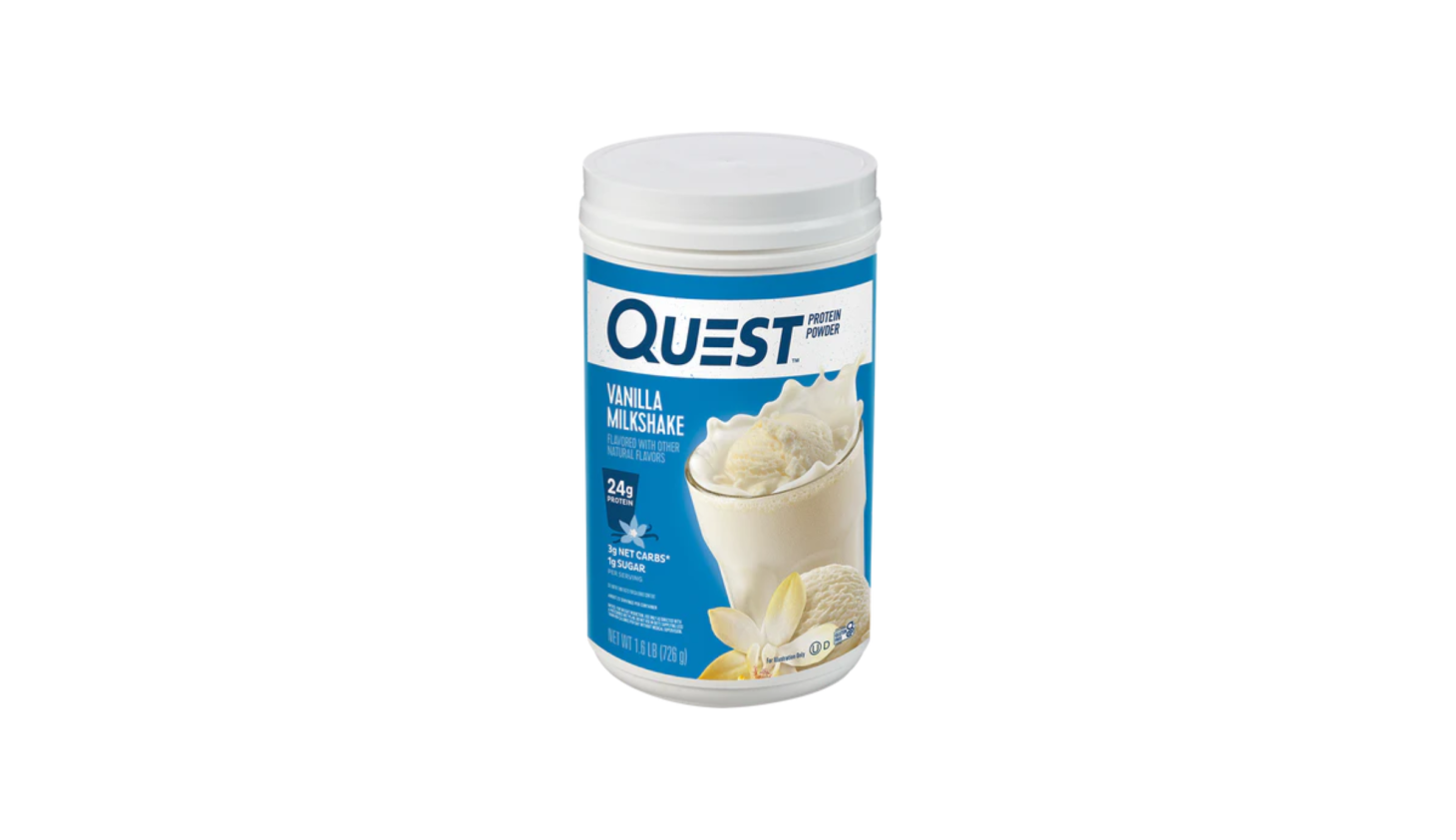
A dietitian-recommended whey protein powder: Quest Protein Powder — $30.00
Protein per serving: 24 g
Kirkpatrick recommends the Quest protein powders, citing its high its high-quality ingredients. “It offers high-quality whey as its main ingredient,” she says, adding that it’s low in sugar and tastes great. The featured pick has one gram of sugar from sucralose and stevia to lend it sweetness, but otherwise, its ingredients list is short and simple. You can select from a variety of flavors, including vanilla (pictured above), chocolate, salted caramel, peanut butter, cinnamon, and cookies and cream. It also comes in an unflavored version that you can add to smoothies as well as baked goods for a protein boost.
Cost: $1.74 per serving (23 servings total)
Serving size: 1 scoop
Protein source: Whey
Flavors: Vanilla Milkshake, Chocolate Milkshake, Salted Caramel, Peanut Butter, Cinnamon Crunch, Cookies and Cream
Pros:
- Low in sugar
- Variety of flavors, including unflavored version
Cons:
- Made with sucralose, which is an artificial sugar
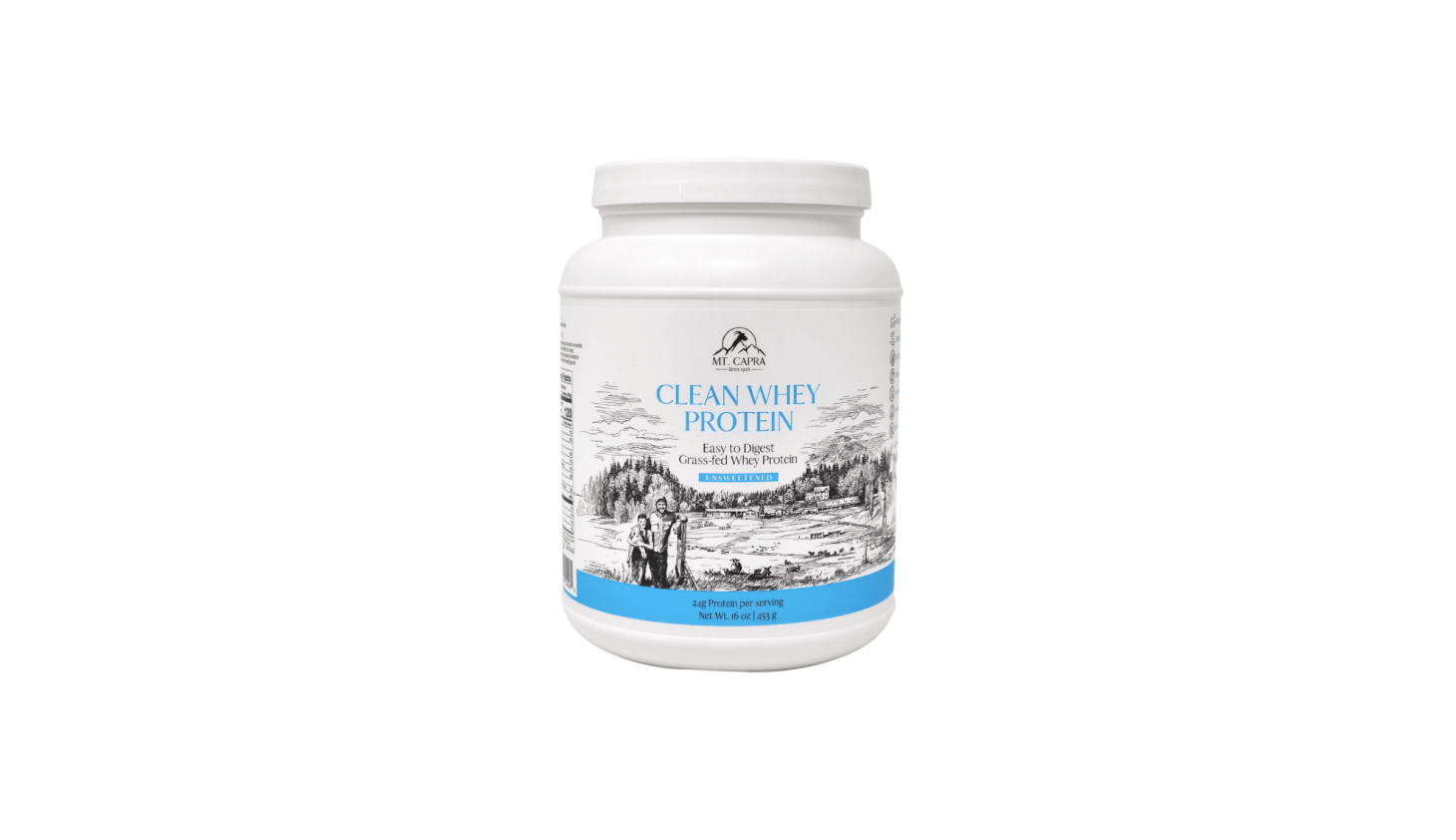
A one-ingredient whey protein powder: Mt. Capra Clean Whey Protein — $41.00
Protein per serving: 24 g
The Mt. Capra Clean Whey Protein has only one ingredient, whey protein from the milk of grass-fed goats, which contains all nine essential amino acids and is purported to be easier to digest than whey protein from cow’s milk. What’s more, the ingredient contains more branched-chain amino acids—essential nutrients that help muscle recovery—than its counterpart, and the overall formulation is non-GMO as well as gluten- and soy-free. You can choose from two flavors, vanilla and unsweetened, the latter of which you can add to a variety of foods without altering their taste so much.
Cost: $2.93 per serving (15 servings total)
Serving size: 2 scoops
Protein source: Whey
Flavors: Unsweetened, Vanilla
Pros:
- Made with only one ingredient—whey protein
- Available in an unsweetened version
Cons:
- Pricey
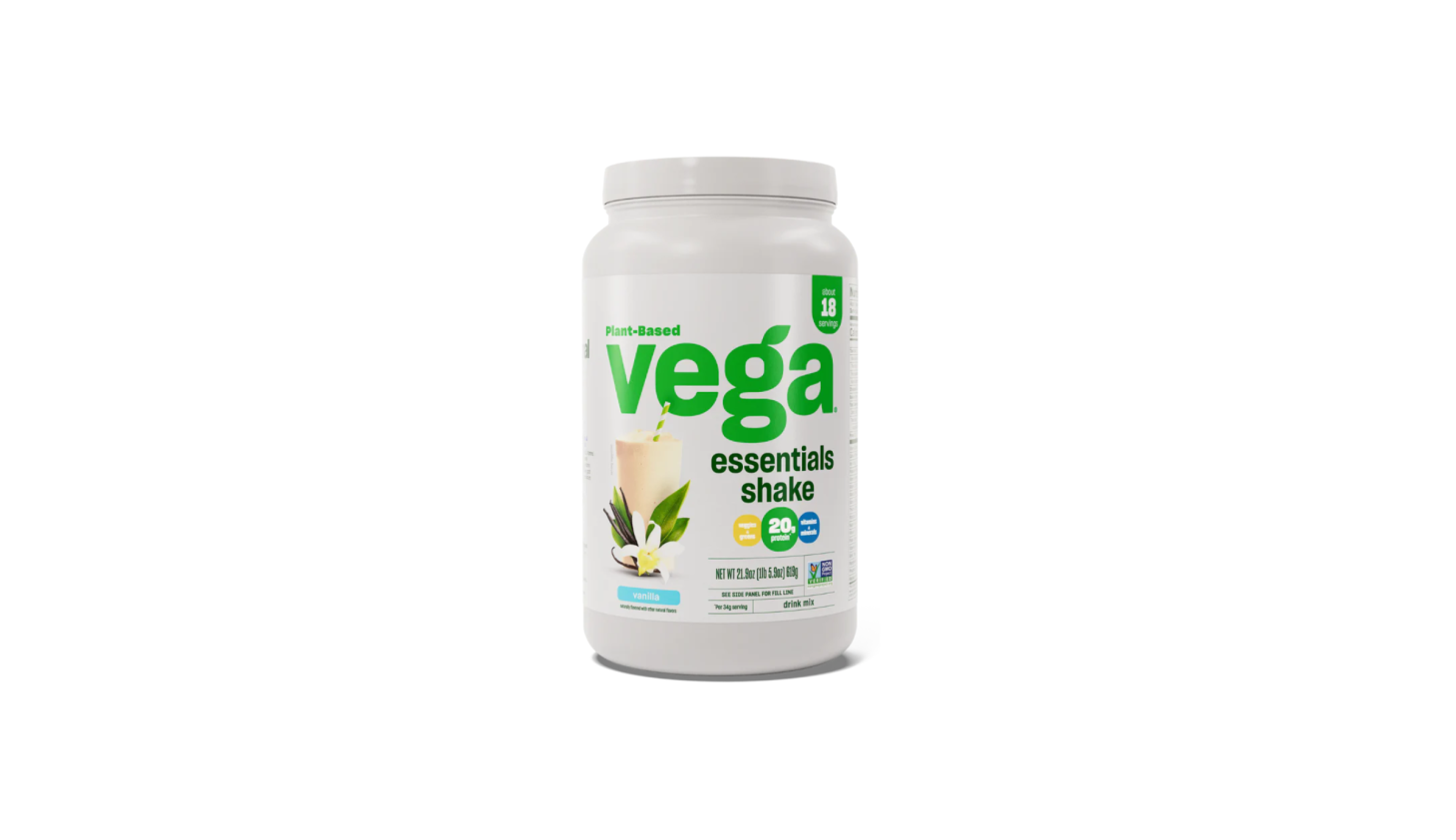
A dietitian-favorite pea protein powder: Vega Original Protein Powder — $47.00
Protein per serving: 25 g
If you want a plant-based protein powder, opt for this pick from Vega. It comes recommended by Manian, who listed it as one of the best vegan protein powders in her previous Well+Good article. Two scoops deliver 25 grams of protein from peas, as well as vitamins, minerals, and omega-3s from flaxseeds. Plus, it’s sweetened with stevia, making it ideal for people who want an option that’s made without artificial additives. Manian attested that it lends itself well to smoothies, oatmeal, pancakes, and more, and proclaimed that it “tastes great” without the chalky aftertaste. Plus, the protein powder is available in three classic flavors—vanilla, chocolate, and berry.
Cost: $2.61 per serving (18 servings total)
Serving size: 2 scoops
Protein source: Peas
Flavors: Vanilla, Chocolate, and Mocha
Pros:
- Non-GMO Project verified
- Made without artificial sugars
Cons:
- Limited flavor options
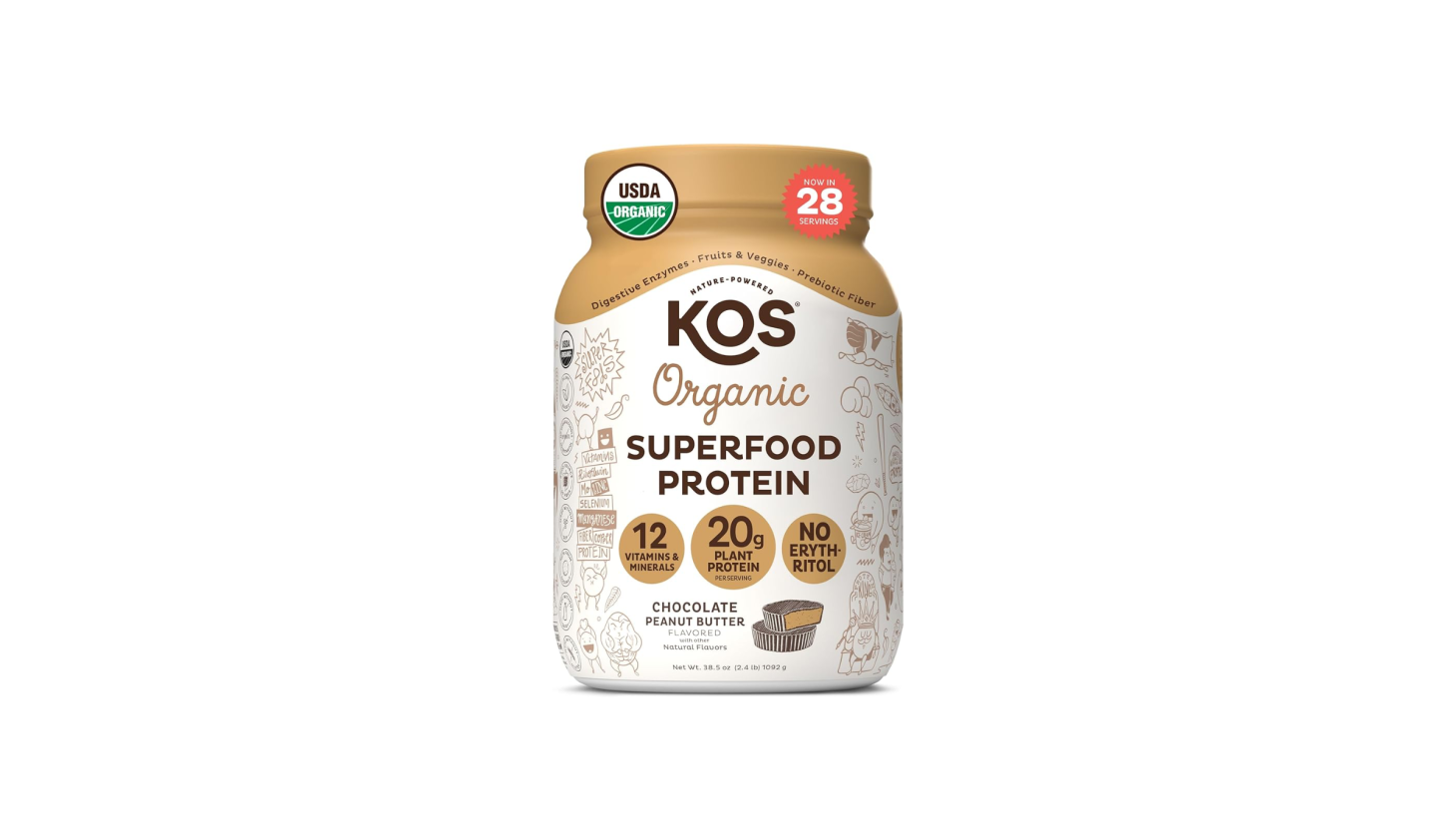
A weightlifter-approved plant-based protein powder: KOS Vegan Protein Powder — $45.00
Protein per serving: 20 g
For a well-rounded and delicious protein powder, spring for this pick from KOS, which also made our list of the best-tasting protein powders. W+G contributor and weightlifter Kayla Hui called the chocolate peanut butter-flavored option (pictured above) the “fraternal twin” of Reese’s Peanut Butter Cups—and the other flavors are equally delicious. Two scoops of the stuff offer 20 grams of protein from humble peas and zero grams of sugar. The sweetness (which Hui says is “not too overpowering or cloying”) comes from stevia and monk fruit, and if you prefer your powders unflavored, KOS also has an option for you.
Cost: $1.61 per serving (28 servings total)
Serving size: 2 scoops
Protein source: Peas
Flavors: Chocolate Peanut Butter, Chocolate, Vanilla, Salted Caramel Coffee, Unflavored
Pros:
- Made without artificial sugars
- Variety of flavors, including unflavored version
Cons:
- Contains two grams of added sugar
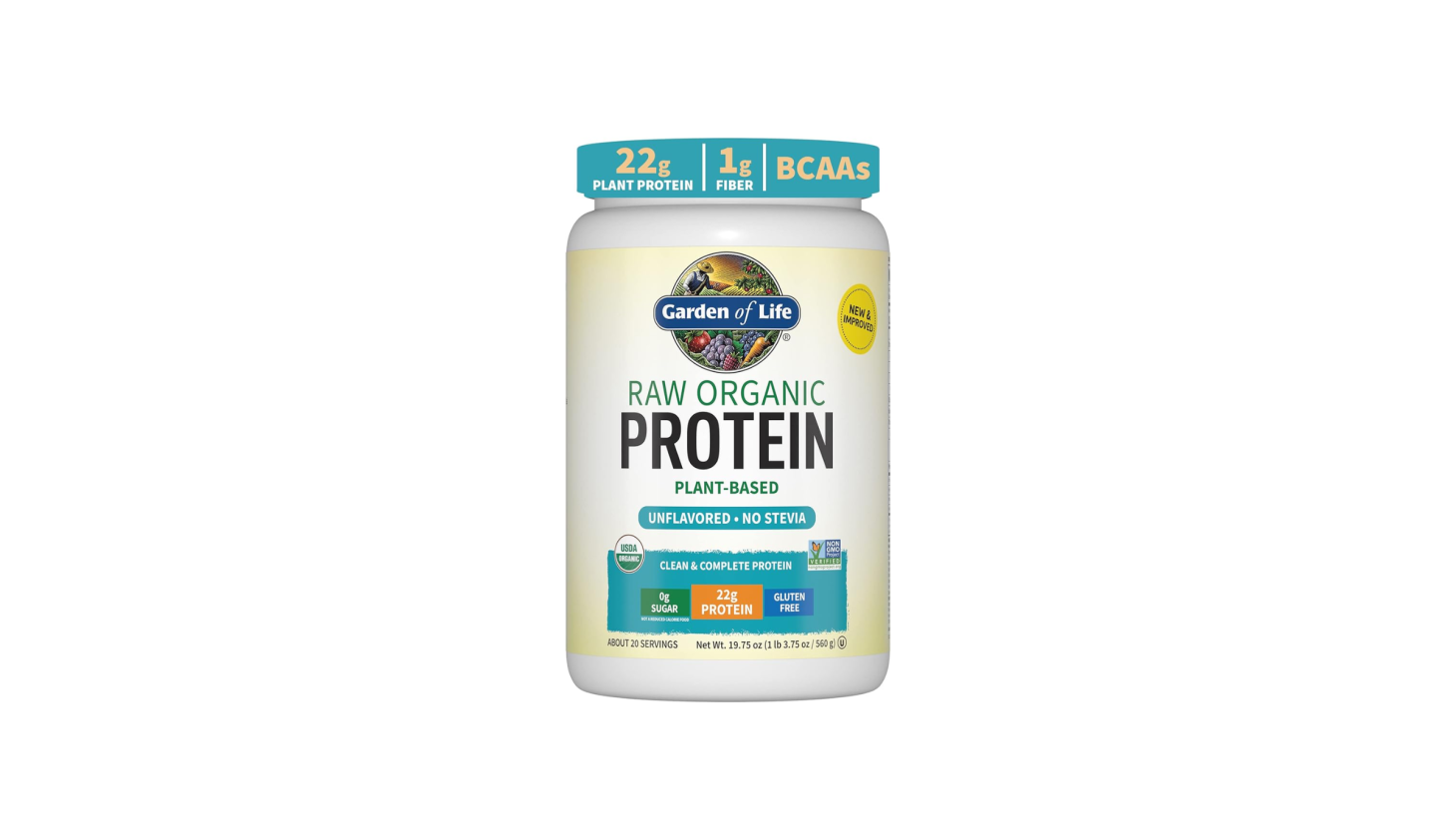
A USDA organic-certified plant-based protein powder: Garden of Life Raw Organic Protein — $34.00
Protein per serving: 22 g
Garden of Life’s protein powder is made with peas, sprouted grains, and seeds, and it offers 22 grams of protein in one serving, including branched-chain amino acids from USDA-certified organic ingredients. The formulation is also non-GMO, free from gluten and added sugar, and NSF-certified. Along with protein, it also includes probiotics and digestive enzymes, too. Natural sweeteners stevia and erythritol lend to the chocolate and vanilla options’ flavor, but Manian previously mentioned that they can lean too sweet for her liking and she prefers the unflavored version. Regardless of your preference, it has a “smooth texture,” she says.
Cost: $1.70 per serving (20 servings total)
Serving size: 1 scoop
Protein source: Peas
Flavors: Chocolate, Vanilla, Unflavored
Pros:
- Made with USDA-certified organic ingredients
- NSF-certified
Cons:
- Flavored options might be too sweet for some people
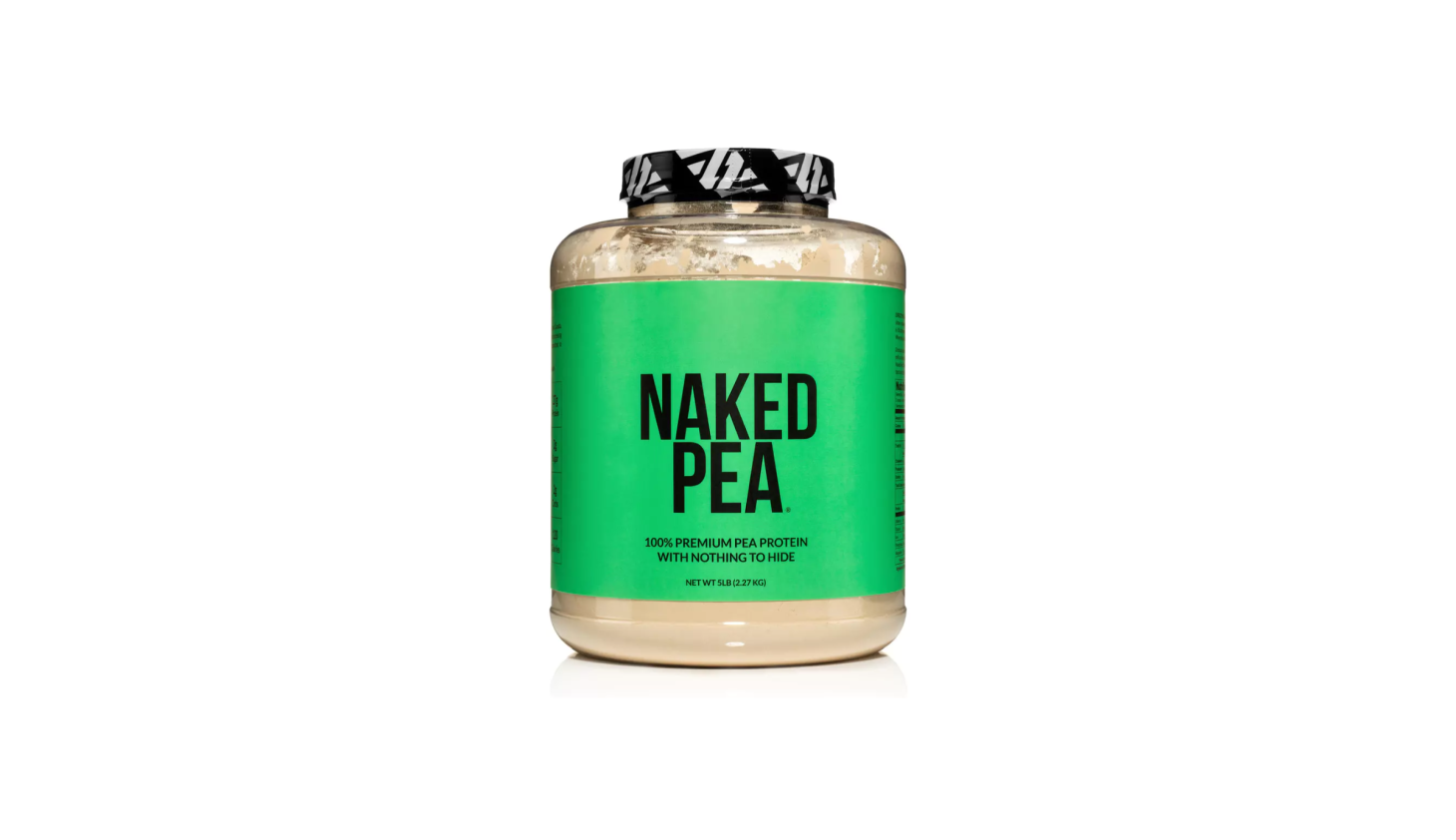
A budget-friendly plant protein powder: Naked Pea Protein Powder — $58.00
Protein per serving: 27 grams
This plant-based protein powder keeps things simple. The formulation delivers 27 grams of pea protein—and that’s theonly ingredient included in the unflavored version pictured above. It’s non-GMO and dairy-, soy-, and gluten-free, and made without additives, too. If you opt for any one of its flavored versions, just note that it contains additional ingredients that contribute to its taste. (For reference, the chocolate-flavored option is made with coconut sugar and cacao, in addition to peas.) Plus, the powder is Informed Choice-certified so you know that it’s free of unwanted additives.
Cost: $0.74 per serving (78 servings total)
Serving size: 2 scoops
Protein source: Peas
Flavors: Chocolate, Vanilla, Chocolate Peanut Butter, Double Chocolate, Unflavored
Pros:
- Only made with one ingredient (unflavored version)
- Informed Choice-certified
Cons:
- Large size only
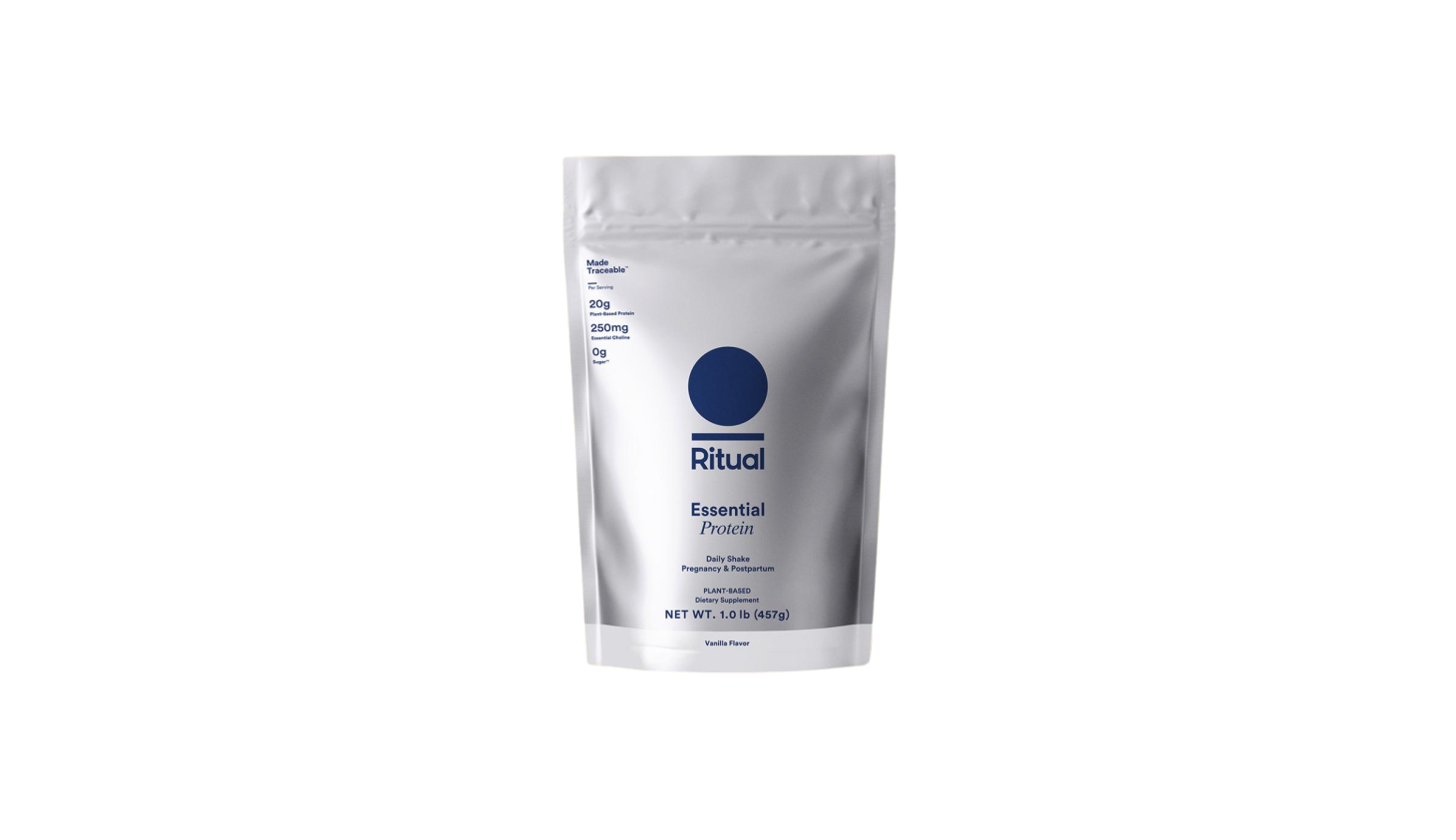
A vegan protein powder for pregnant people: Ritual Essential Protein Daily Shake Pregnancy and Postpartum — $32.00
Protein per serving: 20 grams
Protein is an essential to any diet, but it’s especially important for those who are pregnant and breastfeeding, who may require twice as much protein, and Ritual’s protein powder can help you obtain adequate amounts of the essential macronutrient. One scoop offers 20 grams of protein, as well as 250 grams of choline, a nutrient that is important in embryonic neurodevelopment. This option is also Informed Sport-certified and formulated with USDA-certified organic ingredients. Plus, it’s free of GMOs, artificial colors, flavors, and sweeteners, as well as stevia, sugar, and sugar alcohols. Just be sure to consult your physician before use.
Cost: $2.13 per serving (15 servings total)
Serving size: 1 scoop
Protein source: Pea
Flavors: Vanilla
Pros:
- Made with USDA-certified organic ingredients
- Informed Sport-certified
Cons:
Only one flavor option
READ MORE;
Kalyan Chart 2000 to 2005: An Overview of Historical Data
FOR YOU
Removing Dark Spots with Lemon Juice: A Natural Remedy

Dark spots, also known as hyperpigmentation, can be a source of frustration for many people. While there are various treatments available, some prefer natural remedies like lemon juice. Here’s how you can use lemon juice to potentially lighten dark spots:
1. Prepare the Lemon Juice
Start by squeezing fresh lemon juice from a lemon. You can do this by cutting a lemon in half and using a citrus juicer or simply squeezing it with your hands. Make sure to strain out any seeds or pulp from the juice.
2. Dilute (Optional)
Lemon juice is acidic and can be harsh on the skin, especially for those with sensitive skin. To reduce the risk of irritation, consider diluting the lemon juice with water or aloe vera gel. Mix equal parts lemon juice and water or aloe vera gel to create a diluted solution.
3. Apply to Dark Spots
Using a cotton ball or cotton pad, apply the diluted lemon juice directly to the dark spots on your skin. Gently dab the lemon juice onto the affected areas, ensuring full coverage. Avoid applying lemon juice to broken or irritated skin.
4. Leave on and Rinse
Allow the lemon juice to sit on your skin for about 10-15 minutes. Then, rinse it off thoroughly with lukewarm water. Pat your skin dry with a clean towel.
5. Moisturize and Protect
After rinsing off the lemon juice, apply a gentle moisturizer to hydrate and nourish your skin. It’s also essential to apply sunscreen with SPF 30 or higher, especially if you’re going outside, as lemon juice can make your skin more sensitive to sunlight.
6. Repeat as Needed
Consistency is key when using natural remedies like lemon juice for dark spots. You may need to repeat the process daily or several times a week to see results. Be patient and give your skin time to respond to the treatment.
7. Monitor for Sensitivity
While lemon juice is generally safe for most people, it can cause irritation or allergic reactions in some individuals. If you experience any redness, itching, or discomfort after applying lemon juice, discontinue use and consult a dermatologist.
8. Consider Other Options
If lemon juice doesn’t provide the desired results or if you experience sensitivity, there are other options available for treating dark spots. These include over-the-counter topical treatments, prescription medications, chemical peels, and laser therapy. Consult with a dermatologist to determine the best course of action for your skin.
Using lemon juice to lighten dark spots is a natural and cost-effective remedy that may help improve the appearance of hyperpigmentation. However, it’s essential to use caution and monitor your skin for any adverse reactions. If you have any concerns or questions, consult a dermatologist for personalized advice and treatment recommendations.
READ MORE;
Finding Beer Near Me: Your Guide to Locating the Perfect Brew
Decluttering Homes: The Path to a More Organized and Peaceful Living Space
-

 Cryptocurrency News5 months ago
Cryptocurrency News5 months agoPEPE Outshines Dogecoin And SHIB With 53% Price Eruption Amid Parabolic Bitcoin Rally
-

 Technology2 months ago
Technology2 months agoBloomberg Radio: Your Premier Source for Business and Financial News
-

 FOR YOU2 months ago
FOR YOU2 months agoThe Power of 314159u in Driving Innovation and Growth
-

 work2 weeks ago
work2 weeks agoYour Guide to Creative Solutions: Visit usefulideas.net Today
-

 Blog1 month ago
Blog1 month agoپولٹرجسٹ” میں حقیقی انسانی ڈھانچے استعمال کیے گئے تھے۔”
-

 Blog2 months ago
Blog2 months agoUnderstanding the Benefits and Uniqueness of “Wellhealthorganic Buffalo Milk Tag”
-

 FOR YOU2 months ago
FOR YOU2 months agoDecluttering Homes: The Path to a More Organized and Peaceful Living Space
-

 FOR YOU2 months ago
FOR YOU2 months agoThe 7 Best Protein Powders for Women, According to RDs
